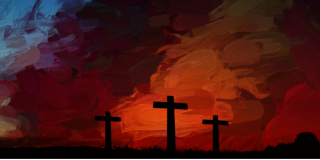Today is Maundy Thursday, the day on which Christians remember two great symbolic acts of Jesus: the celebration of the Passover and the washing of his disciples feet. Passover festival was a celebration of the liberation of the Israelites from slavery in Egypt, a liberation that was accomplished through the means of violence that I find almost incomprehensible when attributed to God. The text of Exodus suggests that God and Pharaoh, representing the gods of Egypt, went to war, culminating in God killing the firstborn child of every Egyptian family and then drowning the Egyptian army in the Red Sea.
I don’t know what to do with that. I cannot explain how it fits with what Jesus shows me of God, that God is loving, gracious, compassionate, kind, merciful, and just. What I do comprehend is that when Jesus celebrated the Passover with his disciples that night he invested it with new meaning. For Christians the meaning of Passover is now associated with the death and resurrection of Jesus, in which God accomplished salvation not by violently subduing his enemies but by taking on himself all the hatred, violence, anger, and brutality that they could muster, and responding with grace and forgiveness. God triumphed not by proving himself more powerful in violence than the Romans, nor more vindictive than the powers of evil, but having exposed himself to the full force of their violence such that the life of Christ was extinguished, God did something extraordinary, something that injected a new possibility into reality. God raised Jesus from the dead, signalling that after evil has exhausted itself to the point of death God has created a new way to life.
It’s therefore significant that on the same day Jesus invested the Passover with new meaning, he knelt down and washed his disciples feet. In the Israel of Jesus day dust would accumulate on people’s feet as they travelled, so a bowl of water and a towel would be offered to guests when they arrived at a house to allow them to wash the dust from their feet. If the house had a servant, the servant may have been required to play this role, but never the master of the house. By washing his disciples feet Jesus reinforces the truth that his life, and the life of his God, was grounded in service of others.
I still don’t know what to do with the story of the Exodus. I celebrate the liberation Israel from slavery. I can even bring myself to recognize that at some level evil such as slavery and oppression have to be met with some measure of force. But the slaughter of the firstborn child of each household? The drowning of an entire army? I cannot explain these, and in one way I don’t need to, For Jesus took the memory of violence perpetrated by God and turned it into a memory of violence perpetrated against God and of God responding with nothing but a kindness, generosity and grace, and carving the new possibilities of resurrection into the hard walls of reality. That I can and will celebrate.







When God ceased being a perpetrator of violence and became its victim. A Maundy Thursday reflection |… https://t.co/FtZk9eT9Co
RT @scottjhiggins: When God ceased being a perpetrator of violence and became its victim. A Maundy Thursday reflection |… https://t.co/Ft…
Nicely written “For Christians the meaning of Passover is now associated with the death and resurrection of… https://t.co/xLREgjRoIP